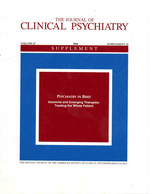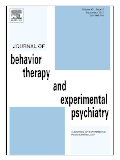
PSYCHIATRY-INTERPERSONAL AND BIOLOGICAL PROCESSES
Scope & Guideline
Bridging Biological Insights and Interpersonal Dynamics
Introduction
Aims and Scopes
- Interdisciplinary Research in Psychiatry:
The journal publishes studies that integrate biological, psychological, and social perspectives on mental health, showcasing research that spans various disciplines within psychiatry. - Clinical Applications and Interventions:
A significant focus is placed on clinical practices, including innovative therapeutic interventions, treatment efficacy, and patient management techniques, aimed at enhancing patient outcomes. - Emerging Trends in Mental Health:
The journal actively explores contemporary issues in psychiatry, including the impact of technology on mental health, societal influences, and new therapeutic modalities. - Diversity and Inclusion in Mental Health:
Research addressing the nuances of mental health across different populations, including minority groups, is prominently featured, reflecting the journal's commitment to diversity in psychiatric research. - Public Health and Policy Implications:
The journal also emphasizes the importance of understanding the broader public health implications of psychiatric disorders, including policy changes and the socio-economic factors affecting mental health services.
Trending and Emerging
- Digital Therapeutics and Telepsychiatry:
There is a growing emphasis on studies exploring digital tools and telehealth solutions for mental health treatment, particularly in response to the COVID-19 pandemic and the increasing demand for remote care. - Impact of Social Media on Mental Health:
Research examining the influence of social media platforms on psychiatric conditions, particularly among younger populations, has gained traction, addressing contemporary concerns about identity, behavior, and mental health. - Integrative Approaches to Treatment-Resistant Depression:
The journal has seen an increase in publications focusing on innovative treatments for depression that do not respond to traditional therapies, including the use of ketamine and other novel pharmacological agents. - Intersection of Mental Health and Public Health:
Emerging research linking mental health outcomes with broader public health issues, including substance abuse, obesity, and chronic health conditions, reflects an integrated approach to healthcare. - Cultural Competence and Mental Health Services:
There is a rising interest in the implications of cultural diversity on mental health treatment and outcomes, highlighting the need for culturally competent practices in psychiatric care.
Declining or Waning
- Traditional Psychoanalytic Approaches:
There has been a noticeable reduction in the publication of research grounded in classical psychoanalytic theory, as contemporary studies increasingly favor evidence-based practices and integrative approaches. - Focus on Historical Case Studies:
Research centered on historical psychiatric case studies appears to be waning, with a shift towards studies that emphasize current clinical practices and evidence-based outcomes. - Pharmacology of Older Medications:
The exploration of older pharmacological treatments is less prevalent, with a trend towards investigating newer therapies and novel treatment modalities in the field of psychiatry. - Generalized Anxiety Disorder as a Standalone Topic:
While anxiety disorders remain a topic of interest, the focus has shifted towards more specific conditions and their interplay with other psychiatric disorders, leading to fewer standalone publications on generalized anxiety disorder. - Cognitive Behavioral Therapy (CBT) Research:
Although CBT remains a cornerstone of psychiatric treatment, the volume of new research specifically dedicated to CBT techniques has decreased as the field moves towards exploring more diverse and innovative therapeutic approaches.
Similar Journals

Annals of Clinical Psychiatry
Illuminating the Path to Better Mental Health Outcomes.Annals of Clinical Psychiatry, published by QUADRANT HEALTHCOM INC, is a leading journal in the fields of Medicine and Psychiatry & Mental Health. With its longstanding commitment to advancing clinical knowledge since 1989, this esteemed journal contributes invaluable insights into current psychiatric practices and mental health research. The journal is recognized in the Scopus ranking with a position in the 34th percentile, reflective of its focused scope and substantial academic contributions. While access to the journal is tailored for professionals and researchers, the absence of Open Access highlights the journal's dedication to maintaining quality and rigorous peer-reviewed standards. As part of the Q3 quartile for both Medicine and Psychiatry categories in 2023, Annals of Clinical Psychiatry serves as an essential resource for those dedicated to improving mental health outcomes, making it a vital platform for practitioners, researchers, and students alike. Situated in Parsippany, New Jersey, the journal remains a pivotal entity that fosters scholarly dialogue and exploration in clinical psychiatry.

PROGRESS IN NEURO-PSYCHOPHARMACOLOGY & BIOLOGICAL PSYCHIATRY
Transforming Understanding Through Cutting-Edge ResearchPROGRESS IN NEURO-PSYCHOPHARMACOLOGY & BIOLOGICAL PSYCHIATRY, published by PERGAMON-ELSEVIER SCIENCE LTD, is a leading peer-reviewed journal that serves the interdisciplinary field of neuropsychopharmacology and biological psychiatry. With an impressive impact factor in the first quartile of both Biological Psychiatry and Pharmacology categories, this journal provides a critical platform for the dissemination of cutting-edge research and innovative therapeutic approaches. Covering a broad range of topics from the molecular mechanisms underlying psychiatric disorders to advanced pharmacological interventions, it aims to foster scientific dialogue among researchers, clinicians, and students alike. The journal has been at the forefront of scientific inquiry since its inception in 1982 and continues to evolve, adapting to the ever-changing landscape of neuroscience and mental health research. With its focus on high-quality articles and a commitment to advancing the understanding of neuropsychopharmacology, this journal is essential for anyone interested in the complexities of brain function and mental health.

Progress in Neurology and Psychiatry
Fostering innovation in the understanding of the human mind and brain.Progress in Neurology and Psychiatry is a pivotal journal published by John Wiley & Sons Ltd, dedicated to advancing the fields of neurology and psychiatry. With a robust history dating back to its establishment, this esteemed journal holds a consistent Q3 ranking in 2023 across several categories including Neurology, Clinical Neurology, Psychiatry, and Mental Health, signifying its significant contribution to the scientific community. This journal serves as a vital source of knowledge and insight, publishing original research, reviews, and case studies that explore the intricacies of neurological and psychiatric disorders. Although it does not offer open access, the journal remains accessible to a wide audience through institutional subscriptions. By fostering a platform for scholarly discourse, Progress in Neurology and Psychiatry aims to bridge the gap between research and practice, ultimately enhancing the quality of care for individuals with neurological and psychiatric conditions. Researchers, clinicians, and students are encouraged to engage with the journal's comprehensive content to stay informed of the latest developments and emerging trends in these critical fields of medicine.

JAMA Psychiatry
Bridging Research and Real-World Impact in PsychiatryJAMA Psychiatry, published by the American Medical Association, stands as a leading peer-reviewed journal in the fields of psychiatry and mental health, featuring an impressive impact factor that reflects its significance in advancing research and clinical practice. With an ISSN of 2168-622X and an E-ISSN of 2168-6238, this journal operates on a comprehensive access model that allows for the dissemination of vital research findings to a global audience. Since its inception in 2013, JAMA Psychiatry has consistently ranked in the top quartile (Q1) in both the Medicine (miscellaneous) and Psychiatry and Mental Health categories, with a remarkable Scopus rank of #4 out of 567, placing it in the 99th percentile. Addressed from its headquarters in Chicago, Illinois, the journal's objectives encompass the publication of original clinical research, innovative treatment strategies, and insightful reviews that enrich the understanding of psychiatric disorders. By bridging the gap between research and real-world application, JAMA Psychiatry remains an essential resource for researchers, clinicians, and students dedicated to improving mental health outcomes.

Frontiers in Psychiatry
Advancing the Science of Mental HealthFrontiers in Psychiatry is a leading journal dedicated to advancing research within the field of psychiatry and mental health. Published by FRONTIERS MEDIA SA, the journal has established a commendable reputation since its inception, reflected in its Q1 status in the 2023 Psychiatry and Mental Health category and a robust ranking of 142 out of 567 in the Scopus database. With an open access model initiated in 2009, Frontiers in Psychiatry aims to disseminate high-quality research to a global audience, fostering collaboration and innovation among researchers, clinicians, and students alike. The journal covers a broad spectrum of topics, including neurobiology, psychosocial factors, treatments, and public health implications of mental disorders, ensuring comprehensive representation of contemporary psychiatric science. Located in Lausanne, Switzerland, and running until 2024, the journal not only emphasizes the importance of mental health research but also encourages interdisciplinary discourse, making it an essential resource for anyone invested in the well-being of individuals and communities alike.

JOURNAL OF CLINICAL PSYCHIATRY
Fostering breakthroughs in the understanding of psychiatric disorders.The JOURNAL OF CLINICAL PSYCHIATRY is a premier publication dedicated to advancing the understanding and treatment of psychiatric disorders. Established in 1978 and published by Physicians Postgraduate Press, this esteemed journal provides a vital platform for researchers, clinicians, and mental health professionals to share innovative findings and evidence-based practices in psychiatry. With an impressive impact factor and recognized as a Q1 journal in both Medicine (miscellaneous) and Psychiatry and Mental Health, the journal ranks among the top in its field, sitting at 96th out of 567 in Scopus rankings, placing it in the 83rd percentile. The journal's commitment to high-quality, peer-reviewed articles facilitates the dissemination of knowledge crucial for advancing clinical practices and improving patient outcomes. Access to its latest research is offered through institutional subscriptions, making it an essential resource for anyone involved in the mental health sector, from seasoned practitioners to aspiring students.

JOURNAL OF BEHAVIOR THERAPY AND EXPERIMENTAL PSYCHIATRY
Advancing the frontiers of psychological research.Welcome to the Journal of Behavior Therapy and Experimental Psychiatry, a distinguished publication in the field of psychological research, recognized for its commitment to advancing knowledge in behavior therapy and experimental psychiatry. Published by Pergamon-Elsevier Science Ltd in the United Kingdom, this journal plays a crucial role in disseminating innovative findings and theoretical advancements since its inception in 1970. With an impressive array of impact factors, this journal proudly holds a Q1 ranking in Arts and Humanities (miscellaneous) and Q2 rankings across Clinical Psychology, Experimental and Cognitive Psychology, and Psychiatry and Mental Health categories in 2023. The journal provides a platform for both established researchers and emerging scholars to share insights that enhance practice and inform policy in mental health. Although not an Open Access journal, it ensures broad accessibility to its content through institutional subscriptions and affiliations. By focusing on high-quality, rigorous research, the Journal of Behavior Therapy and Experimental Psychiatry continues to shape the understanding of behavioral interventions and their psychological implications, making it an indispensable resource for professionals and students alike.

CHILD PSYCHIATRY & HUMAN DEVELOPMENT
Pioneering Research in Child Psychiatry and DevelopmentCHILD PSYCHIATRY & HUMAN DEVELOPMENT, published by Springer, stands at the forefront of research in the fields of developmental and educational psychology, pediatrics, perinatology, and child psychiatry. With an ISSN of 0009-398X and an E-ISSN of 1573-3327, this esteemed journal has been a vital resource for academics since its inception in 1970. Currently ranked in the Q1 category across its multiple relevant disciplines, it illustrates a significant impact with its Scopus rankings, placing it within the top 13% for pediatrics and child health and the top 18% for developmental psychology. Its comprehensive scope ensures that leading-edge studies, reviews, and discourse are accessible, contributing greatly to the understanding of mental health and developmental processes in children. With no open access option, the journal maintains a commitment to high-quality, peer-reviewed content that is invaluable for researchers, healthcare professionals, and students alike, as they strive to advance their knowledge and practices in child psychology and human development.

EUROPEAN ARCHIVES OF PSYCHIATRY AND CLINICAL NEUROSCIENCE
Contributing to the Evolution of Psychiatric and Neuroscience ResearchEuropean Archives of Psychiatry and Clinical Neuroscience is a prominent peer-reviewed journal published by Springer Heidelberg, focusing on the interdisciplinary aspects of psychiatry and clinical neuroscience. With an ISSN of 0940-1334 and an E-ISSN of 1433-8491, this journal provides a rigorous platform for innovative research spanning biological psychiatry, pharmacology, and various aspects of mental health. The journal boasts a distinguished impact factor that places it in the Q2 category for Biological Psychiatry and Q1 in both Medicine (miscellaneous) and Psychiatry and Mental Health as of 2023, reflecting its significant contribution to the field. Additionally, its Scopus rankings highlight its esteemed position among the top journals, particularly in Medicine and Neuroscience disciplines. Readers can access a wealth of valuable research articles, case studies, and reviews, crucial for advancing understanding and treatment within these vital fields. Initially converged in 1990, the journal continues to evolve and support scholarly dialogue until 2024 and beyond, making it an essential resource for researchers, clinicians, and students alike.

Asia-Pacific Psychiatry
Elevating Psychiatric Practices Through Rigorous ResearchAsia-Pacific Psychiatry is a leading academic journal published by WILEY, focused on the diverse and rapidly evolving fields of psychiatry and mental health within the Asia-Pacific region. With an ISSN of 1758-5864 and an E-ISSN of 1758-5872, this journal has been recognized for its significant impact, holding a Q1 ranking in Medicine (miscellaneous) and a Q2 ranking in Psychiatry and Mental Health as of 2023. Its commendable Scopus ranking places it at Rank #83 out of 567 in its category, highlighting its influence and relevance in contemporary research. The journal aims to facilitate the dissemination of high-quality research, reviews, and clinical insights that address mental health challenges, promote global understanding, and encourage collaboration among professionals and academics. Although it is not an open-access journal, the high impact factor underscores its value in the scholarly community, making it an essential resource for researchers, clinicians, and students dedicated to enhancing mental health practices and policies in the region and beyond.